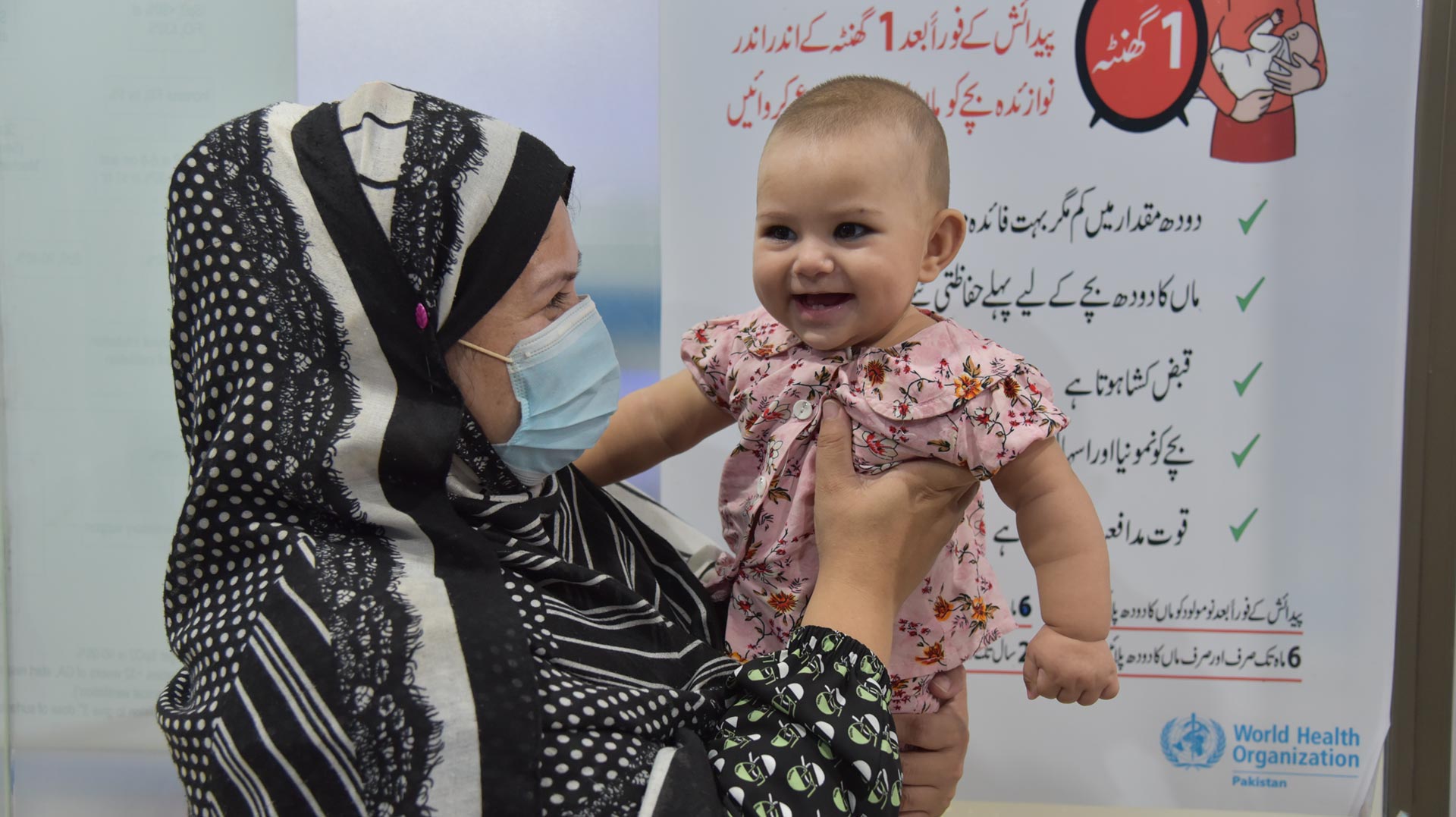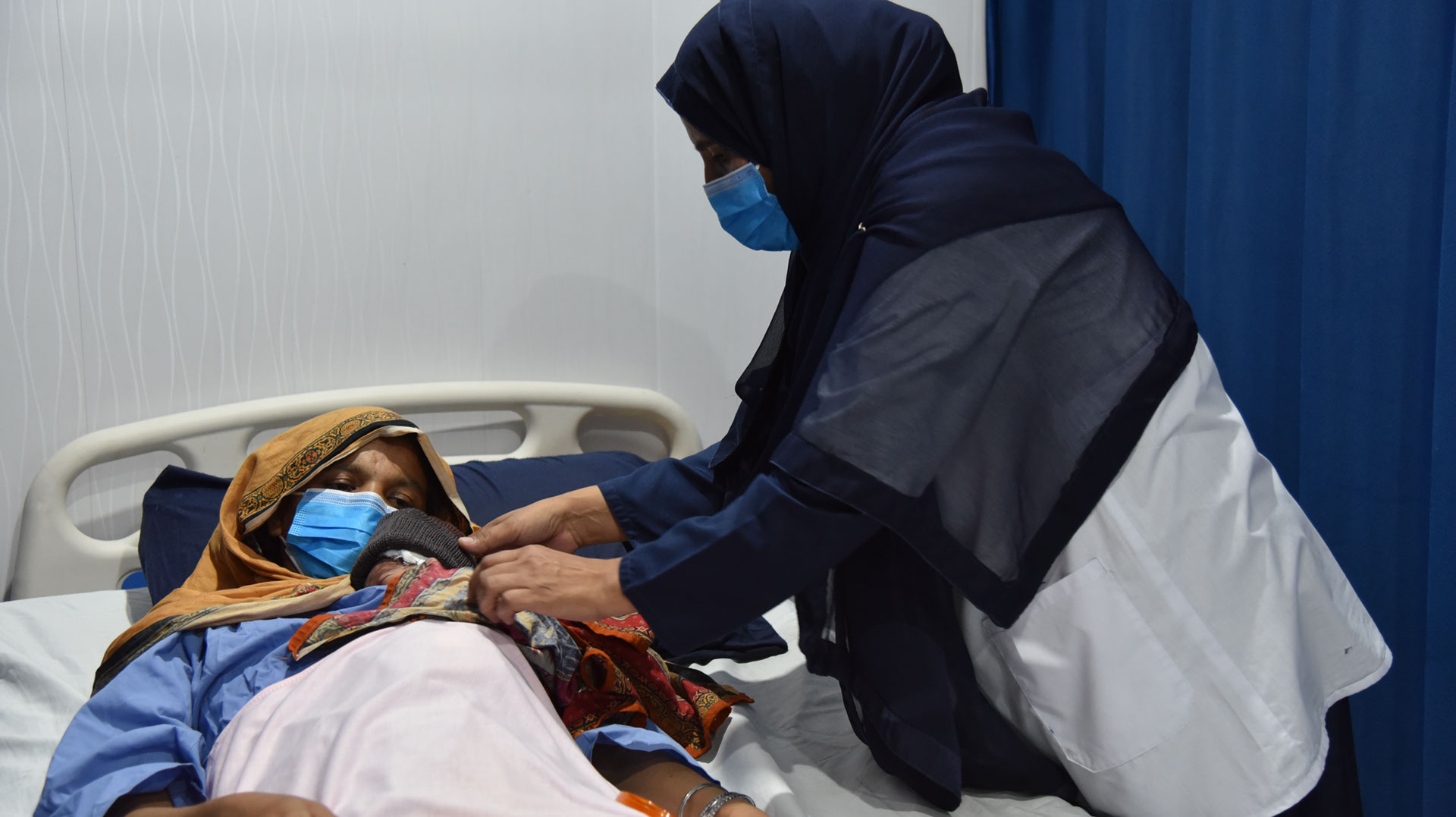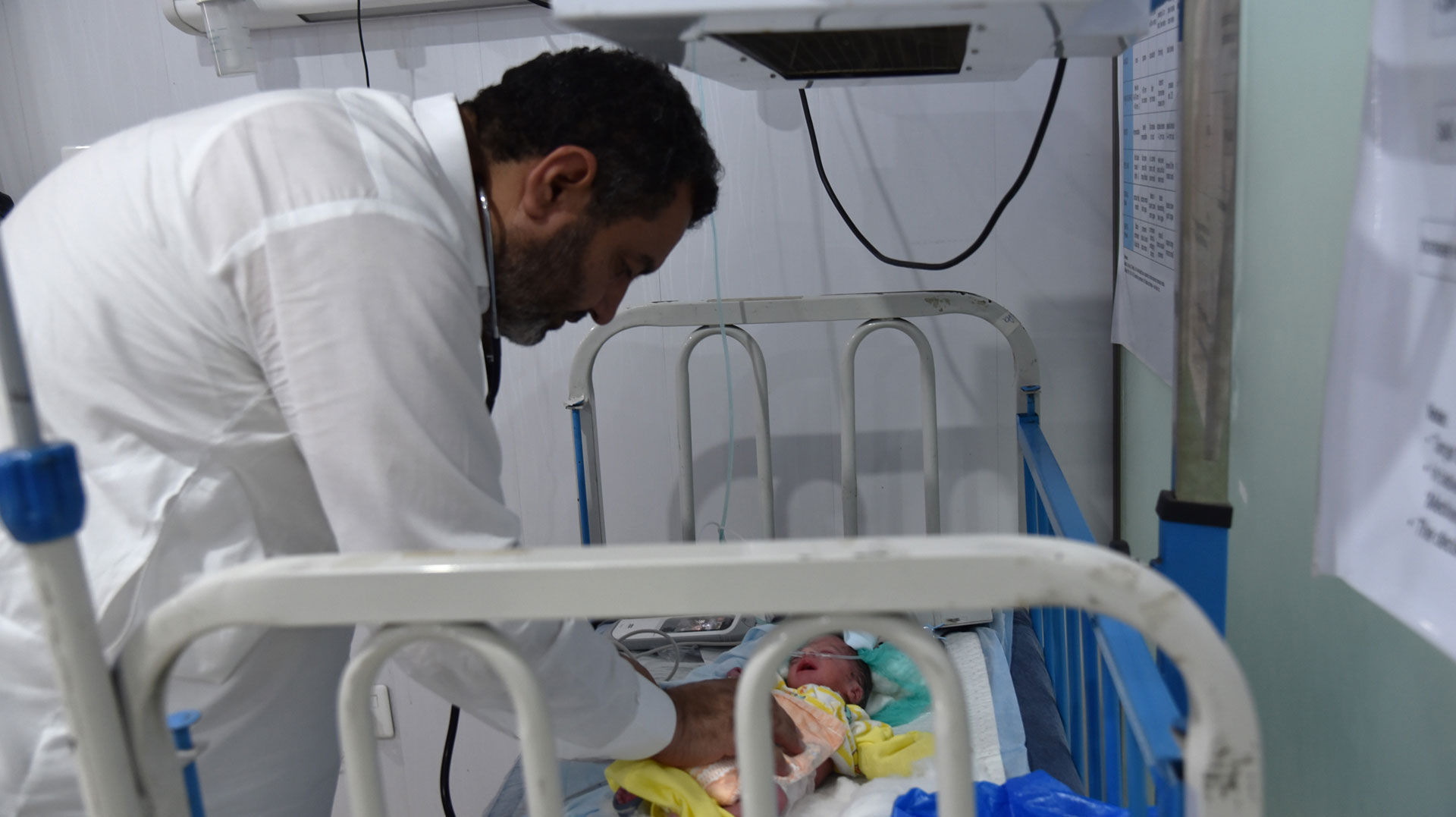 Faiza with her daughter Aizal on her follow-up visit at the Kangaroo Mother Care Centre, Haripur District Headquarters Hospital. 10 September 2025, Islamabad - "We stayed at the Kangaroo Mother Care Centre because Aizal had low weight, only 2 kilograms,” said Faiza, a mother from Haripur, Khyber Pakhtunkhwa province, Pakistan. Aizal, a “miracle” baby awaited by her parents for 7 years, was born with low weight. "I was so worried for her, but after being admitted to the centre, she became healthy, and I was happy." Even at home, Faiza continued the skin-to-skin contact, sometimes for 7 or 8 hours a day.
Faiza with her daughter Aizal on her follow-up visit at the Kangaroo Mother Care Centre, Haripur District Headquarters Hospital. 10 September 2025, Islamabad - "We stayed at the Kangaroo Mother Care Centre because Aizal had low weight, only 2 kilograms,” said Faiza, a mother from Haripur, Khyber Pakhtunkhwa province, Pakistan. Aizal, a “miracle” baby awaited by her parents for 7 years, was born with low weight. "I was so worried for her, but after being admitted to the centre, she became healthy, and I was happy." Even at home, Faiza continued the skin-to-skin contact, sometimes for 7 or 8 hours a day.
The Kangaroo Mother Care (KMC) initiative, supported by the World Health Organization (WHO), is an innovative approach that contributes to patient safety. It enhances the survival and well-being of preterm and low-birth-weight infants through a science-based method that promotes skin-to-skin contact, exclusive breastfeeding and support for early discharge from the hospital. Since 2021, a total of 35 965 infants weighing 2000 grams or less have been treated in 17 KMC centres supported by WHO across Pakistan.
 Sundus Javed with her son at the Kangaroo Mother Care Centre, Haripur District Headquarters Hospital. Photo: Sara Akmal/WHO PakistanSundus Javed has also experienced the benefits of KMC. Her 10-day-old son, still in fragile condition while recovering in an incubator due to low weight, is now feeling better. “I have seen him yawning, moving, and he feels better,” she said.
Sundus Javed with her son at the Kangaroo Mother Care Centre, Haripur District Headquarters Hospital. Photo: Sara Akmal/WHO PakistanSundus Javed has also experienced the benefits of KMC. Her 10-day-old son, still in fragile condition while recovering in an incubator due to low weight, is now feeling better. “I have seen him yawning, moving, and he feels better,” she said.
In Khyber Pakhtunkhwa, the Kangaroo Mother Care Centre at Haripur District Headquarters Hospital, inaugurated in 2024 by the provincial authorities and WHO’s Regional Director for the Eastern Mediterranean, Dr Hanan Balkhy, is crucial for preventing infections – including hospital-acquired infections – and providing a lifeline for the local population and people living in refugee settlements. As described by Dr Muhammad Iqbal, a district paediatrician in Haripur, KMC is “transforming bookish knowledge into practical care.”
"We tell patients that the earlier a mother is involved with a child, even with limited resources, the more infections can be prevented,” said Dr Iqbal.
 Shabnam (nurse) is taking care of admitted patients (mother and newborn) at Haripur’s Kangaroo Mother Care Centre. Photo: Sara Akmal/WHO Pakistan At Haripur’s Kangaroo Mother Care Centre, the nurse Shabnam Gulzar compassionately cares for mothers and children. “Mothers are happy now, and babies gain weight and feed well.”
Shabnam (nurse) is taking care of admitted patients (mother and newborn) at Haripur’s Kangaroo Mother Care Centre. Photo: Sara Akmal/WHO Pakistan At Haripur’s Kangaroo Mother Care Centre, the nurse Shabnam Gulzar compassionately cares for mothers and children. “Mothers are happy now, and babies gain weight and feed well.”
Through KMC, frontline health care workers like Shabnam and Dr Iqbal are empowering mothers, teaching them the vital role of their own touch and warmth, and keeping hope alive, especially for parents who feared for their premature or low-birth-weight babies.
Rafia, head nurse at the Kangaroo Mother Care Centre and the neonatal intensive care unit, highlights the tangible benefits of the facility. "KMC was an innovative concept for us. It resulted in decreased hospital stays for mothers and newborns, and reduced illness rates."
 Dr Muhammad Iqbal checking a newborn at Haripur District Headquarters Hospital. Photo: Sara Akmal/WHO Pakistan While on a follow-up visit with her son Muhammad Shafay, Nuzhat Rehman relates the recovery of her son thanks to KMC. "After Shafay was born, he was not well. Nurses told me that skin-to-skin contact is important for the baby's body temperature and bonding."
Dr Muhammad Iqbal checking a newborn at Haripur District Headquarters Hospital. Photo: Sara Akmal/WHO Pakistan While on a follow-up visit with her son Muhammad Shafay, Nuzhat Rehman relates the recovery of her son thanks to KMC. "After Shafay was born, he was not well. Nurses told me that skin-to-skin contact is important for the baby's body temperature and bonding."
For Faiza's precious Aizal, Nuzhat's resilient Muhammad, and Sundus’s son, the Kangaroo Mother Care Centre is more than just a medical facility. It is a testament to the good care they received, the dedication of the staff, and the innate power of a mother’s embrace. It is where fear transformed into healthy beginnings, vibrant lives, and hopeful futures.
 Nuzhat Rehman with her son Muhammad Shafay at Haripur’s Kangaroo Mother Care Centre. Photo: Sara Akmal/WHO Pakistan
Nuzhat Rehman with her son Muhammad Shafay at Haripur’s Kangaroo Mother Care Centre. Photo: Sara Akmal/WHO Pakistan
 Rafia taking care of newborns at the neonatal intensive care unit of Haripur District Headquarters Hospital. Photo: Sara Akmal/WHO Pakistan
Rafia taking care of newborns at the neonatal intensive care unit of Haripur District Headquarters Hospital. Photo: Sara Akmal/WHO Pakistan
Written by Sara Akmal, in coordination with the RMNCAH team.
Edited by José Ignacio Martín Galán.




